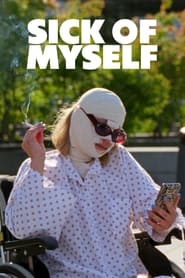Where Sick of Myself succeeds as social commentary, it is in its claim that self-centred thinking is a systemic issue rather than one unique to Signe and that structures such as the press will always be willing to amplify latent narcissistic traits. Still, whilst you never quite get sick of Sick of Myself due to its regular dispensation of dry black comedy, it becomes both a little one-note and a little neglectful of its multiple strands once you hit the 60-minute park. (This latter blemish is a particular shame, as many of the callback gags could have landed far more effectively with subtler handling of the audience's power of recall.)
However, one of the many places where the film falls short as contemporary criticism is that it doesn't attempt to locate the ætiology of the narcissism it portrays. Indeed, that social media and influencer culture are not mentioned at all becomes almost distracting by the end of the film, and it's difficult to ascertain their omission beyond purely aesthetic considerations. Furthermore, the film feels obliged to centre a young woman as the archetype narcissist instead of the usual middle-aged man, but I question where its obligation to provide yet another conduit for misogyny had been sourced. Indeed, there was a (gendered) glee in my cinema when the movie sanctioned denigrating the perceived self-absorption of a woman, which was a little unsavoury to perceive. Finally, whilst I did very much enjoy being respected by the filmmaker (it was surprisingly rare that the observational humour was clearly signposted to the viewer), whether the egotism of the film is actually extant in modern Norway is another open question. Could it be something akin to the Norwegian vasking panic around 2010, where it was disapprovingly rebuked in the press more than it was actually happening?
Indeed, what was the central thesis of Sick of Myself, beyond 90 minutes of admittedly-funny wry observations? (Personally, I enjoyed the pizza oven references.) Was it intended to be notable that the only characters exempt from criticism were the elites dining at the restaurant serving $2,300 wines? Even the blind woman had multiple jokes at the expense of her disability. I find it difficult to reconcile the movie's many signs and allusions within a broader critical project, especially when I attempt to incorporate its jarringly enigmatic conclusion.
Still, with its cruelly narcissistic protagonist and pitch-perfect mise-en-scène, Sick of Myself could be compassionately read as an admirable update of Nathan Barley (Channel 4, 2005), as well as being an inverted version of The Picture of Dorian Gray. But I recall that in Oscar Wilde's telling, as Dorian's soul becomes increasingly corrupt, its evil shows up on the surface of the canvas rather than on Dorian's ever-beautiful face. We must infer, therefore, that within the universe ofSick of Myself, there is a picture of Signe posted by @BasilHallward_UK that will forever stay alluring and young.

